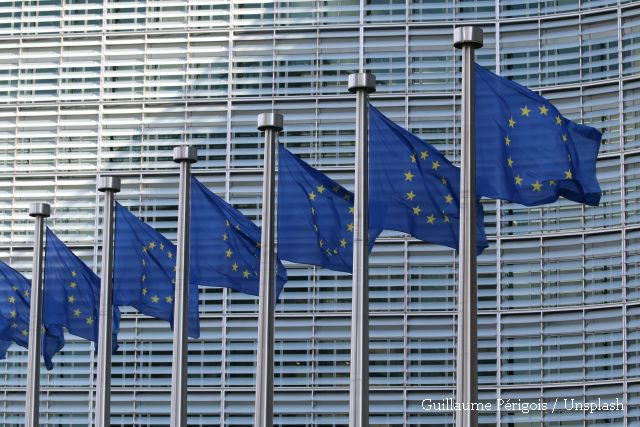Steps towards EU-29 enlargement
Ukraine and the Republic of Moldova obtained in early November the recommendation from the European Commission regarding the start of EU accession negotiations

Corina Cristea, 01.12.2023, 12:20
Candidates
since the summer of last year, Ukraine and the Republic of Moldova obtained in
early November the recommendation from the European Commission regarding the
start of EU accession negotiations. The news was received with joy by the
pro-Western leaders of the two former Soviet countries, but there are still
steps to be taken before integration. The first of these is related to the
decision the European Council made in mid November. In order to adopt the
recommendation made by the Commission, all states must agree, and some, such as
Hungary, have already questioned the appropriateness of this approach.
Then,
if they manage to successfully get through December, in March 2024 the European
Commission will present a new report, analyzing the progress made by Ukraine
and the Republic of Moldova towards the targets they assumed. Now, in the case
of Ukraine, the Commission is recommending that negotiations begin once Kyiv
meets the remaining conditions on fighting corruption and strengthening
minority protection standards. In the case of the Republic of Moldova, these
conditions refer to the fight against corruption and the improvement of
financial regulations. Ukraine will be in the European Union. And we will
achieve this, in particular, by transforming our country – an internal
transformation that is certainly in the interest of our people. For Ukraine, the
EU means economic security and social stability, and for the EU Ukraine means a
strengthening of the entire community, said Ukrainian President Volodymyr
Zelensky.
The decision made by
the European Commission encourages us and empowers us to continue the things we
started: to make Moldova stronger, a state that ensures peace at home and
contributes to regional security and takes care of the well-being of its
citizens. It’s a lot of work. The path we have chosen to walk is full of
challenges. We are not afraid of our work, and our goal is for Moldova to be
ready to join the EU by 2030, said the President of Moldova, Maia Sandu.
How feasible 2030 is as
deadline for accession depends on each individual country, says university professor and former foreign
minister Adrian Cioroianu:
The calendar is
set as a guideline, obviously there is no obligation on the part of anyone for
2030 to be the end point, but we are talking about an encouragement. On the
other hand, it is the EU’s way of keeping these countries close, of giving them
a purpose. Look at the real political difficulties the Republic of Moldova is
facing, at every voting session we get nervous given the political landscape of
the country. Look at what is happening in Serbia, look at the difficulty of
settling this dispute and this trauma that Serbs still feel in their
relationship with Kosovo, etc. These countries must be given a purpose. The
beginning of the journey speaks rather of an intention and of a promise in a
mutual way. The EU recognizes that it needs these states, but these states must
also realize that they can model themselves according to European principles
and values. And of course we want in the end to be more alike than different,
even if even within the EU the differences persist, but let’s hope that similarities
outnumber differences.
Complying with the
recommendations of the Venice Commission is on Ukraine’s to-do list. Are the
authorities in Kyiv determined to follow these recommendations? Here is journalist
Marin Gherman, director of the Institute of Political Studies and Social
Capital in Chernivtsi, attempting an answer:
From my point of
view, there will be a series of attempts by Kyiv, especially concerning the
recommendations regarding the legislation in the field of national minorities,
not to respect them. We also have high-level statements regarding these
recommendations. Why? Because there is opposition in the Ukrainian
parliamentary environment to the idea of changing the legislation in the
field of national minorities, seeing this issue strictly through the war
glasses in Ukraine, and regarding the Russian minority. It is a painful
subject, it is the war with Russia, the full-scale invasion by Russia, and when
the question of the Ukrainian minorities is raised, most of them think of the
Russians, of Russification, of everything that means war. And it is very
difficult for the Ukrainian political elite to escape this vision.
Ukraine also needs a
service reform, says Marin Gherman, and there are also problems in the fight
against corruption. On the other hand, what will happen in Transnistria, as
Chisinau has no control over this separatist region? Does Chisinau undertake to
implement a community acquis throughout the territory of the Republic of
Moldova? Iulian Groza, executive director of the Institute
for European Policies and Reforms in Chisinau says yes:
Yes. And we have
a precedent – the Association Agreement with the EU. When it was concluded it
was agreed that it would be applied throughout the country. The most important
part of the agreement, dealing with trade, entered into force two years later
after the provisional entry. Today, thanks to access to the EU market, the
Transnistrian region is much more strongly anchored in the European space. And
today, in the context of the war and the upheavals in the region, precisely
this is an important counterbalancing element of Russia’s influence in the
Transnistrian region.
The
2023 enlargement package presented by the European Commission provides a
detailed assessment of the current state and the progress made not only by
Ukraine and the Republic of Moldova, but also by the other aspirants to
accession: Albania, Bosnia and Herzegovina, Kosovo, Montenegro, North Macedonia
, Serbia, Turkey and Georgia , the
latter obtaining, moreover, the status of a candidate country. (MI)






























